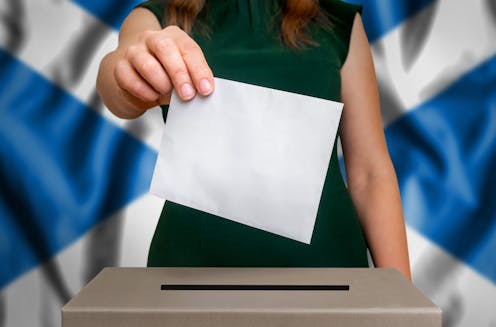
Around the world, interest in lowering the voting age is growing. Major efforts to change the laws are underway in Canada and New Zealand, while Germany recently lowered the voting age for European parliament elections.
But so far, there have been few opportunities to learn from countries that have done it successfully. Austria and a handful of Latin American countries have had more than a decade of votes at 16. Others, like Estonia (for local elections), Malta and some states in Germany have joined the effort in recent years.
Scotland lowered its voting age to 16 ahead of the independence referendum in 2014, and for all Scottish elections starting in 2015. After the 2014 election, politicians, analysts and the Scottish Youth Parliament hailed the decision to lower the age as a success.
Newly enfranchised young people voted in greater numbers than slightly older peers. Social class differences in voting habits were much less pronounced among 16- and 17-year-olds in Scotland, than among older Scottish voters and young people in the rest of the UK. Even the Scottish Conservatives dropped their initial opposition and endorsed a younger voting age.
Our new study reveals which of these patterns have lasted, by examining voter turnout in the 2021 Scottish parliament elections, seven years after the age limit was changed. Scotland is now one of the small set of longer-term case studies on the outcomes of lowering the voting age.
Typically, electoral data shows that turnout is low when voters are in the early years of adulthood, and increases in their mid to late twenties. But 16- and 17-year-olds, when enfranchised, tend to vote in greater numbers than 18- to 24-year-olds. This was the case in Scotland in 2014-15 (when the voting age was lowered). Now we know that this habit has lasted.
We looked at the 2021 election data for the cohorts of voters who were first enfranchised at age 16. Indeed, they continued to turn out in higher numbers, even into their twenties, than young people who attained the right to vote later, at age 18.
In other words, if you give people the right to vote earlier in life, they appear more likely to make voting a habit.
Voting inequality
Among the youngest voters in the 2021 election (16- and 17-year-old first-timers), social class made little to no difference in young people’s likelihood to vote. However, this was not the case for young people in their twenties. For them, turnout was unequal across social classes.
Young adults with parents from higher social classes turned out more often in the 2021 elections than those from lower social classes (except among 16- and 17-year-olds). Apparently, once voters reached the age of 18, and indeed throughout their twenties, the inequalities emerged again, regardless of when they were enfranchised.
The UK has some of the most pressing political inequality in Europe, particularly among young people. In a major 2010 study of 36 countries, England had one of the largest gaps in political understanding between school students from lower and higher occupational status households (topped only by Bulgaria). Inequalities that lead to uneven turnout in elections are a problem for democracy, because non-voters tend to be less well-represented in the politics that result from an election.
Making change last
Our findings tell us that enfranchising people younger might help reduce voting inequality in the short term. But the impact doesn’t seem to last longer than a few years. Families and the resources, attitudes, and political behaviour they pass on to children influence whether or not young people decide to vote once they are allowed to do so. We see that effect in our research.
The one factor that can offset some of these family inequalities is good civic education in the classroom. Research shows that students who engage with social and political issues through civic education are more likely to vote in elections.
Our study confirms that this still matters to young people in Scotland into early adulthood. Young people aged 16 to 31 who recalled taking a course where political issues were discussed were more likely to vote than people who hadn’t taken such a course.
Not everyone has the same quality or access to civic education. Local authorities decide on the nature and extent of the delivery of civic education, which often takes place in Scotland’s modern studies courses.
When resources are constrained, some schools cannot afford to dedicate equal amounts of time to civic education. This results in a postcode lottery for young people, and some will miss out on the support they might need to exercise their right to vote.
It’s not enough to make sure that young people keep voting – a healthy democracy needs the habit to stick equally for young people of all backgrounds.
The data collection for this project was funded through a grant from the Scottish Government. The analyses presented were carried out independently by the authors of the study and all views expressed are solely the views of the authors.
The data collection for this project was funded through a grant from the Scottish Government.
This article was originally published on The Conversation. Read the original article.







